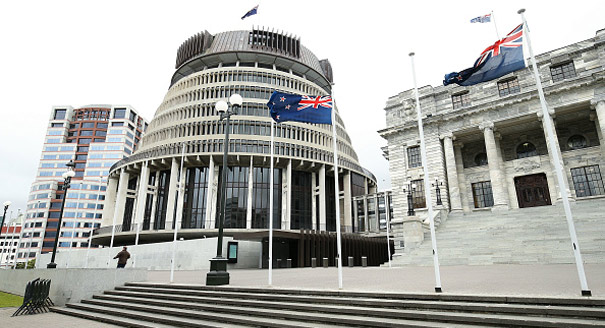It’s not often that a New Zealand prime minister visits Brussels. But the trip by Bill English to the EU capital on January 10 could pave the way for opening bilateral trade talks. At least, that is the hope.
The EU, particularly the European Commission, has over the years forged many big trade deals across the world as an open economy and trading bloc. More importantly, when the EU was founded almost sixty years ago, the commission was invested with special powers. Since then, it has had the exclusive right to negotiate and implement trade deals.
That is, until recently. Under the terms of the Lisbon Treaty, which came into force in 2009, the European Parliament and the EU member states have more rights than before to scrutinize trade deals. National legislatures can even tear them up. This almost happened toward the end of 2016, when a regional parliament in Belgium opposed an EU-Canada trade agreement.
Arm twisting by Canadian and EU officials eventually overcame the veto. But the episode left a sour taste all round, not least in the commission and among non-EU governments wanting to sign up to an accord with a continent that is the biggest export market for 80 countries.
Indeed, there is now every possibility that the attraction of striking a trade deal with the EU will be diluted by the growing power of an array of interest groups—environmental, health, and cultural campaigners, antiglobalization movements, and Euroskeptics. Doing business with the EU would become less attractive if pressure from these groups meant that tariffs and other restrictive measures remained in place.
The consequences could be considerable. One is that Europe would lose influence in helping set global standards and rules for trade and commerce. Another is that powers such as China could well exploit this potential decline of the EU by stepping in to sign even more bilateral deals with countries that sense European protectionism becoming stronger.
“A can of worms has been opened,” argued Patrick Köllner, director of the GIGA Institute of Asian Studies in Hamburg, Germany. “There are now different groups of people opposing trade deals. In some ways, it’s an unraveling of European integration,” he said in an interview.
It’s all too easy to blame the lobbies. In many ways, the EU—or rather, the member states—have only themselves to blame. The Lisbon Treaty, aside from giving EU countries and the European Parliament new powers, was also supposed to streamline decisionmaking and make the EU more efficient and more transparent. But efficiency and transparency are not easy bedfellows.
For example, the commission came in for a lot of flak over the conduct of negotiations on the proposed Transatlantic Trade and Investment Partnership (TTIP). Those talks are now deadlocked if not moribund, particularly given U.S. President-elect Donald Trump’s protectionist views on trade. The European Parliament as well as hundreds of anti-TTIP movements accused the commission of lacking transparency, of trampling over Europe’s consumers, and of undermining health and environmental standards. The commission was slow to react. “Sure, the commission could do better by communicating its policies,” Köllner said. “But it’s very difficult in the post-truth world.”
Apart from all the interest groups challenging the commission, the EU must also reckon with the sheer complexity of trade deals, which cover many topics that are not part of the commission’s powers. That is one of the issues that held up the Canadian deal: it was not exclusively a trade agreement.
The EU faces the same problem with Singapore. The city-state is the EU’s largest trading partner in the Association of Southeast Asian Nations (ASEAN) and Asia’s second-largest investor in the EU after Japan. No wonder both sides want to clinch the EU-Singapore Free Trade Agreement.
Were it as easy as that. On December 21, the Court of Justice, the EU’s judicial authority, issued an opinion on how the trade deal between Singapore and the EU could be implemented. “Not all parts of the agreement fall within the EU’s exclusive competence and therefore the agreement cannot be concluded without the participation of all of the Member States,” Advocate General Eleanor Sharpston argued.
It’s an important opinion not only for setting out clearly the EU’s exclusive powers but also for sending a signal to those countries that want a comprehensive trade deal with the EU. They will be beholden to the union’s national and regional parliaments—38 in all. Each of them will have to ratify any trade accord. Sharpston continued, “The Advocate General notes that difficulties may arise from a ratification process involving all of the Member States alongside the EU, [but] she considers that that cannot affect the question of who has competence to conclude the agreement.”
So if Bill English and Jean-Claude Juncker, president of the European Commission, consider opening trade negotiations with New Zealand, the country’s prime minister need only talk to his Singaporean colleagues. Perhaps it would be best to go for a slimmed-down, watertight trade accord that corresponds to the EU’s exclusive powers. The alternative is to face powerful farm lobbies in Poland, France, and other countries that could delay or scupper ratification—were negotiations to reach that level. Such is the new battleground for a Europe built on open economies and an open trading environment that are now under threat.






